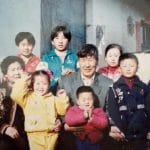
Born in a small town by the sea in the south of Sweden, I am the youngest of three sisters. Languages and different cultures have always caught my interest. After high school I travelled and worked abroad for a few years. I have a Master’s Degree in Political Science, International Relations. I work as a coordinator for educational academic programmers at university level in Stockholm. I stayed at home with my kids for a total of three years. My husband and I live in Stockholm with our son (16) and daughter (15)
Sweden consistently ranks among top 3 countries in the world for raising children. The country is known for its family-friendly policies, besides safety, equality and well developed public education and healthcare*. Sweden is also known for equal employment rate among men and women.
Family Wise:
Both parents can take up to 240 days off each, with salary, for care of a child under 18 months. Parents with children under eight years have the right to work fewer hours and to be home from work to be with sick children.
Children can attend day care from the age of 8 months. There is a small monthly fee but a place is guaranteed by the municipality you live in. School starts at the age of six and goes on until the graduation from high school, at the age of 19. Hence the school has a great responsibility not only for educating children but also for looking after each child’s needs and for teaching them what is right and wrong in life. Medical care is free of charge for children.
*Source – US News (in partnership with Y&R BAV and Wharton School
Roaming around freely with my dog in the fields of a small town by the sea in southern Sweden, without any worry in the world, well aware that my mother is at home, cleaning and preparing food for us. That is how I remember my childhood.
My father worked as an engineer full time in the city nearby. My mother, an airhostess before marriage, stayed at home taking care of the children and the household until I was eight years old. Thereafter she worked part-time at a local library.
As children, we climbed trees, built huts and played games like hide and seek, skipping rope, hopscotch and marbles when outdoors and with dolls, and LEGO, cars and train tracks, indoors. We would play all day, only to get home in time for dinner around 5 or 6 pm. My father was strict with rules around the dinner table.
From the age of six, we had some chores to do around the house; like making our own bed, running errands or helping with the dishes.
There is belief in Sweden that working, keeping busy is what keeps us moving forward.
From the age of 9 years, we managed our weekday sports activities on our own. Our parents did not take us to sports practice, watch games or be part of the parent organization at school. Although, our father would drive us to horseback riding on Saturdays. Along the drive, he would tell us personal anecdotes and share his life stories.
It is difficult to talk about traditional parenting and values in Sweden, as one of the things that characterizes Sweden is our ability to adapt and change. We are a small group of about ten million people, dependent on the world around us to survive in the harsh north.
Life and Living in the Harsh North
The weather is what we were born with, so it is not strange for us, as it may seem for outsiders. It can be a nuisance though, at times.
We simply need to dress up warm, have warm houses. Central heating becomes essential. It takes extra time to get ready to go out in winter. We need to set money aside to be able to buy warm shoes/ boots, jackets, hats, mittens, scarves and Long Johns for the winter.
The cold is not as difficult to deal with as the darkness, though it is more subtle. We often do not see sun in the winter. Mid-winter sun rises at 8.43 am and sets at 2.48 pm in Stockholm. School and work start at 8 in the morning and end between 3 and 5 pm.
We may bring a picnic with sandwich and something warm to drink like hot blueberry soup or hot chocolate. It is a lovely scene.
Fun fact: Swedes consume the most coffee per capita in the world.
Traditional parenting in Sweden, before Second World War II included: obedience, rigorous, strict rules and physical punishment. These views on parenting have changed after 1945. And since 1979, physically punishing children is against the law.
Thinking back to the days of my grandparents, born at the beginning of the last century, values that we still have in common are; integrity, belief that individuals have to be strong themselves and work hard to be a good citizen, and that every person has the same value.
Traditional values in Sweden are; integrity, individualism, equality and a special love for nature.
Although the values are still the same, many things have changed since then.
One of the changes is the significance of family in an individual’s life. Family was more important to an individual back then, than it is now, as one would depend on the family for roof over head, food on the table, care for children and elderly and also medical care. Swedish politicians in power have worked their way from traditional way of living to a society where an individual would be able to cope on own, with very little dependence on the family. The Swedish version of the social contract was created on that basis.
“This decision is for you to make. You have to take your responsibility as a parent and decide for me!”
The imperative came from my daughter when she was 4 years old.
I had asked her about when to get her hair cut. It is symbolic of the time we live in now. That is the second big change, the way we treat our children. We now give almost too much responsibility to our children, which may cause them anxiety.
Now a days, parents in Sweden are now known to treat their children as ‘projects’; with a mission to make them as perfect as possible, fulfilling all their potential and opening all the possibilities available to them. In some sense, it means to give the children what you did not have.
Another change now is too much information; there is world of information coming at you with all the impressions. As a response to this and to the ‘no limits’ in the sixties, today’s parents often talk about the art of setting limits for their kids (and themselves) in order to be able to make the decisions you have to make in life. In that context rituals are important.
For me it is important to do things together as a family; not only the fun stuff but also the ordinary; laundry, shopping for groceries and cooking. Having dinner together allows us to listen to what children have to tell about their day and share something from our own.
My favourite ritual, as a mother, has been the bedtime story ritual. Reading to my children every night for about 15-20 minutes is wonderful; it brings such feeling of calm, home and family while learning about new things in life. When they were really small they would be in the sofa with me looking at pictures and seeing the text. As they grew older they would lay in bed while I read.
‘To me, parenting is about helping your children to find themselves, to help them be the best they can.’
To be able to see both – your child’s individual needs and capabilities. To share your experience and to guide them through life’s ups and downs, acknowledging all feelings. To be a good parent you should set a good example. You should yourself do what you want your children to do. The trick is to agree together as a family, on certain rules which apply to all members of the family and ensure all members are appreciated and acknowledged.
My favourites, with family – Cecilia Forssman
Top three things to do
- Playing board games or cards
- Skiing
- Riding our bikes
Top three places to go
- Our house in the south of Sweden
- Mountains to go skiing or hiking
- The Stockholm archipelago
Books to read with kids:
- Pippi Long stocking by Astrid Lindgren
- Pettson and Findus by Sven Nordqvist
- Busytown by Richard Scary
- Winnie the Pooh by A A Milne
Top three movies:
- 101 Dalmatians
- Robots (children’s movie starring the robot Rodney Copperbottom)
- The Kings Speech



